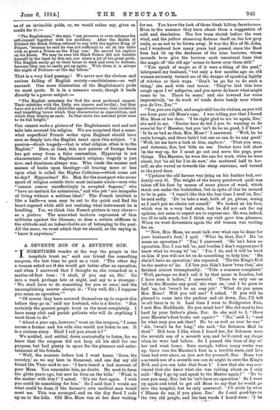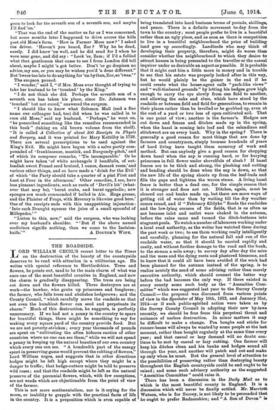A SEVENTH SON OF A SEVENTH SON.
SOMETIMES wonder at the way the people in the hospitals trust us," said our friend the consulting surgeon, the last time he paid us a visit. "The other day a woman asked me if she would get better after an operation, and when I answered that I thought so, she remarked in a matter-of-fact tone : 'I shall, if you say so, Sir.' Go into a ward, perhaps late at night, and say to a stranger : We shall have to do something for you at once,' and the uncomplaining answer always is : Very well, Sir ; I suppose you mean an operation."
" Of course they have screwed themselves up to expect this before they go in," said my husband, who is a doctor. " But certainly the poorest people trust us the most completely. I have many club and parish patients who will do anything I want them to do."
"About a year ago, however," went on the surgeon," I came across a farmer and his wife who would not listen to me. It is a curious story. Shall I tell you about it ? "
We nodded, and settled down contentedly to listen, for we knew that the surgeon did not keep all his skill for one purpose, but had plenty to spare for the pleasure and enter- tainment of his friends.
" Well, the summer before last I went home, ' down the country,' as we say here in Somerset, and one day my old friend the Vicar said to me : 'I have heard a bad account of poor Moss, You remember him, no doubt. He used to farm the glebe years ago, but now he lives on the hills." What is the matter with him r I asked. 'It's his foot again. I wish you could do something for him.' So I said that I would see what could be done, if the farmer's own medical man would meet me. This was arranged, and on the day fixed I rode up on to the hills. Old Mrs. Moss was at her door waiting for me. You know the look of those bleak hilltop farmhouses. Even in the summer they have about them a. suggestion of cold and desolation. The few trees shrink before the west wind, and the yellow stonecrop flattens itself on the low grey walls, so as not to be blown away. It was the Eve of St. John, and I wondered how many years had passed since the Baal fires had lit up the darkness of the nine barrows, whose mounds here give the horizon such unnatural lines that the magic of ' the old age' seems to hover over them still." "You speak of magic as if it were a thing of the past." interposed any husband, "but only a few months ago an old woman seriously warned me of the danger of speaking lightly of witches or their ways. ' Don't 'ee go for to do such a thing,' she said with real terror. ' They've laid this here cough upon I wi saltpetre, and you never do know what might come to 'ee. There be some,' and she lowered her voice impressively, 'as do work wi toads down handy near where you do live, Zur.' " "Yea, you are right, and magic still has its victims, as you will see from poor old Moss's case. I was telling you that I found Mrs. Moss at her door. 'I be right glad to zee 'ee again, Zur,' she said to me. ' Doctor here do tell I you be wanting to do some'at for t' Maester, but you 'on't do he no good, I d' know.' Is he as had as that, Mrs. Moss P' I answered. Well, he be main hrougb, and there bain't but one as can do he any good.' Well, let me have a look at him, anyhow.' That you may, and welcome, Zur, but 'tide no use. Doctor here will show 'ee the way up, for I must go out and serve the pegs, poor things. The Maester, be were the one for work, when he were about, but 'tis all for I to do now,' she muttered half to her- self, as she waved us towards the steep staircase, and turned to the yard door.
"Upstairs the old farmer was lying on his feather bed, evi- dently very ill. The weight of the heavy patchwork quilt was taken off his foot by means of some pieces of wood, which stuck out under the bedclothes, but in spite of this he seemed to be in pain. wasn't like this the last time I seed 'ee, Zur,' he said sadly. 'Do 'ee take a seat, both of ye, please, seeing as I can't put no chairs out meself.' We looked at his foot, which was in a very bad state, but he did not ask for my opinion, nor seem to expect me to express one. He was, indeed, too ill to talk much, but I think my visit gave him pleasure. When we went downstairs again the old woman was waiting for us.
'• • Now, Mrs. Moss, we must talk over what can be done for your husband's foot,' I said. What be that, Zur ? Do 'ee mean an operation?' ' Yes,' I answered. 'He 'on't have no operation, Zur, I can tell 'ee, and besides I don't suppose you'd know what be wrong wi"un." Yes, I do, and it will be hard on him if you will not let us do something to help him.' He sha'n't have no operation,' she repeated. "Tie the King's Evil be the matter wi' he. I'd 'low you didn't know 'twos that,' she finished almost triumphantly. "Tidn a common complaint.'
• Well, perhaps we don't call it by that name in London, but I have seen it before,' I answered. There be only one as 'ull do the Maester any good,' she went on, • and I be goen to find 'un, but 'twon't be an eau job.' What do you mean Mrs. Moss ? Will you tell me ? ' I asked. `If you will be pleased to come into the parlour and zit down, Zur, I'll tell 'ee all there is to it. Last time I were to Bridgwater Fair, I met Mrs. Hoddinott. Do you mind her P She did used to live hard by your father's place, Zan So she said to I, "Have your Maester's foot broke out again P " " No," said I; " and for what may you ask that? He be as well as ever he was."
" 'twon't be for long," she said, "for Solomon Mail be dead." Did turn I like, when I heard her, for Solomon were the seventh son of a seventh son, and he'd cured my Jarge when he were bad before. So I passed the time of day we her and went home. Sure enough, before many weeks was up, there was the Maester's foot in a terrible state, and he's been bad ever since, as you saw for yourself, Zur. None but a seventh son of a seventh son can do aught to cure the King's Evil, and you can take that from L' I saw that she was con- vinced that she knew what she was talking about, so I only said : May I go up and speak to the Master again ? " To be sure you may, Zur, but he 'on't have no operation.' So I went up again and tried to get old Moss to say that he would go into the hospital, but he only answered: • I'll abide by what t' Miseus du say, if you place, Zur.' So I said good-bye to the two old people, and the last words I heard were : 'I be goen to look for the seventh son of a seventh son, and maybe rn find 'an.'
"That was the end of the matter as far as I was concerned, but some months later I happened to drive across the hills past old Moss's farm. ' How is Farmer Moss now ? ' I asked the driver. 'Haven't you heard, Zur P Why he be dead, sarely. I did know 'un well, and he did send for I when he were near gone, and did say: "Look 'ee, Zara; if I'd a follied what that gentleman that came to see I from London did tell about, maybe I might 'a got better. Don't 'ee go despisen no advice, my son, or you may be wishen you'd 'a done different," But 'Were too late to do anything for 'un by then, Zur, so 'twee.'"
The surgeon paused.
"I wonder," said I, " if Mrs. Moss ever thought of trying to take her husband to be 'touched' by the King."
".I do not think she did. Perhaps the seventh son of a seventh eon has taken his place, since Dr. Johnson was ' touched ' but not cured," answered the surgeon.
"I should like to know what Solomon Mail (and a fine name our colleague had, too) did when he was called in to cure old Moss," said my husband. " Perhaps," he went on, "he prescribed something like the remedies recommended in this book" (taking an old brown volume from the shelf). "It is called A Collection of about 300 Receipts in Physic and Surgery, and it was printed for Mary Kettilby in 1728. There are several prescriptions to be used against the King's Evil. He might have begun with a salve partly com- pounded of frankinsense, mastick, and Burgundy-pitch,' and of which its composer remarks, "Tis incomparable.' Or he might have taken ' of white archangels 2 handful's, of out. landish sweet Fennel seed bruized, 1 ounce, damask roses,' and various other things, and so have made a ' drink for the Evil' of which the Party should take a quarter of a pint First and Last at Four in the afternoon.' Other remedies, I see, have less pleasant ingredients, such as roots of ' Devil's bit' (what- ever that may be), burnt crabs, and burnt eggshells; new sponges are much commended if boiled in Ale. Hogs grease, and the Plaister of Frogs, with Mercury is likewise good here.' One of the receipts ends with this unappetizing injunction : 'Into each Draught squeese the juice of a small spoonful of Millepedes."
"Listen to this, now," said the surgeon, who was looking over my husband's shoulder. "'But if the above named medicines signifie nothing, then we come to the Incision-











































 Previous page
Previous page